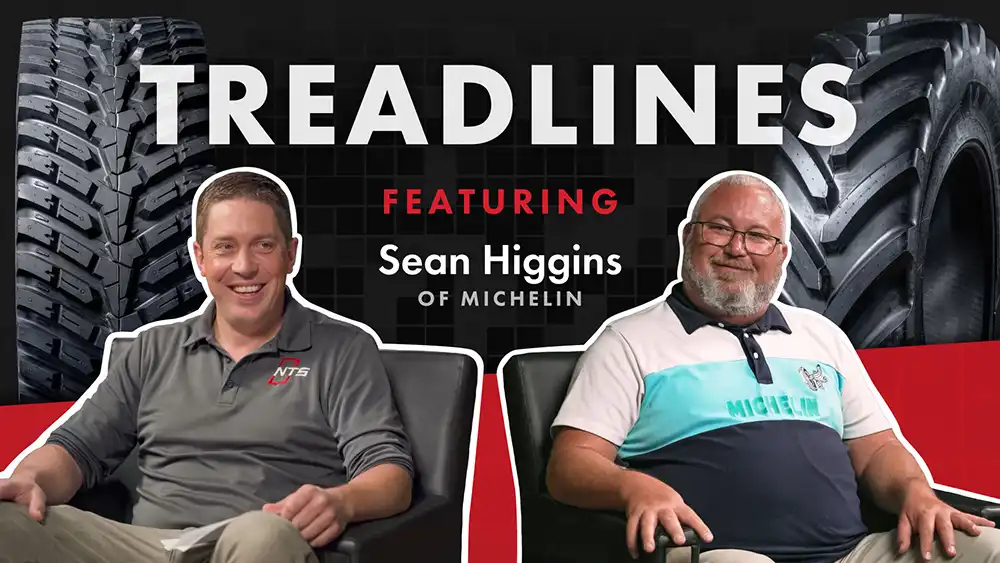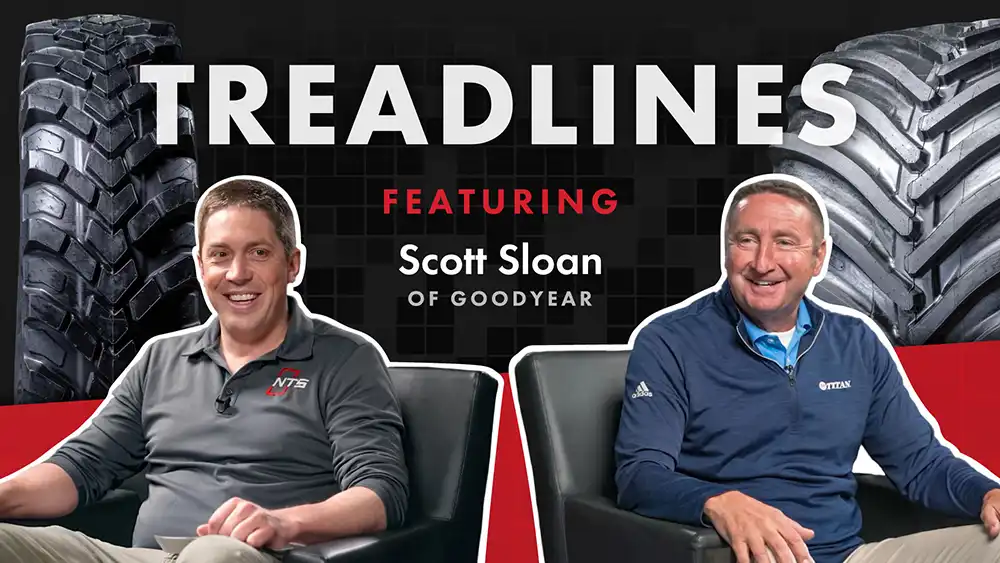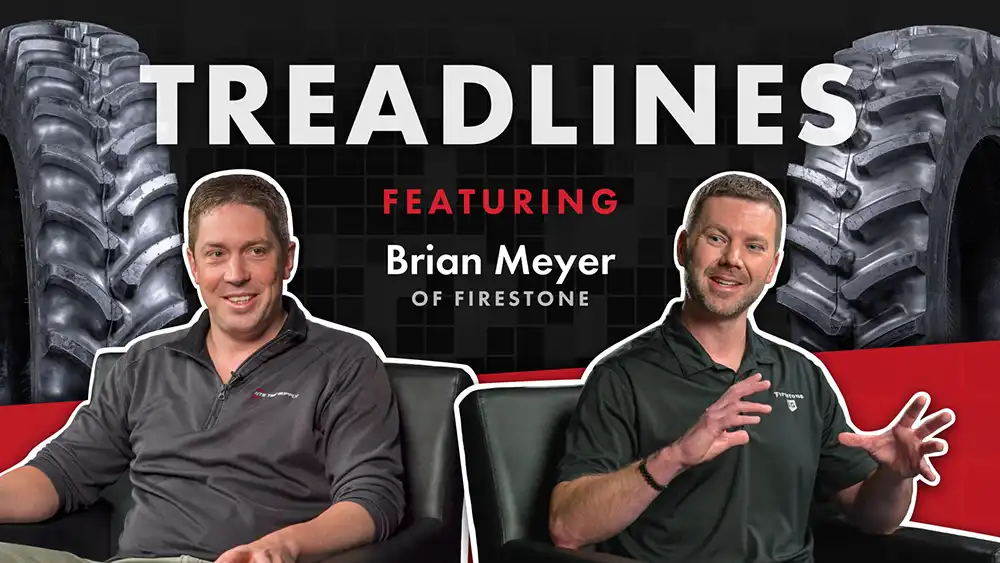Here’s a question to think about: What is the difference between a tire failure on your 4WD tractor and a tire failure on your ripper? The size of the tire. Both blowouts are going to sideline your operation. And if the tire didn’t go flat in your shop in front of the workbench with all the tools ready to go, it’s going to take some time to get back up and rolling whether the flat is big or small. For this reason alone, it pays to pay attention to the health of your farm’s implement tires.

Older Bias-Ply Implement Tires Can Leave You Flat
In the last 10 years, large ag tires and tracks have driven enormous improvements for farmers: more traction, less slip, faster working speeds, and less yield-robbing soil compaction. And then there are the workhorse implement tires, lagging behind (literally). Implement tires almost never capture the spotlight. Until one fails and leaves you searching for your tools and a replacement tire. However, times are changing: Manufacturers have designed tire models that can better support the weight of your large implements and safeguard your soil. In many instances, it pays to upgrade old bias-ply rubber to new radial models so you can maximize uptime and help prevent your day from going flat.
3 Reasons Your Old Implement Tires Fail Under Pressure
- Implements are larger and heavier than ever. And they won’t be shrinking anytime soon. The pressure to get more fieldwork done in less time means that large is here to stay. Old-tech tires are often overloaded on these machines. This may work for short distances, however . . .
- Implements are racking up more road miles than ever. Heavy loads and high speeds are a recipe that is sure to cook tires that aren’t up to the task.
- Many implements have space constraints for mounting tires. It would be great if you could simply mount a taller or wider tire to more easily handle the load. However, on many implements, space is already tight, so larger tire sizes are a no-go.
Your #1 Solution: Run with Radial Implement Tires
Today, you need your implement tires to perform both on the road and in the field. Sure, they have to be able to carry the implement’s weight at high speed down the road, but you also care about the health of your soil. While implement tires aren’t powered, they can still cause damage in your fields. Bias ply tires are OK as long as you can keep your air pressures low in the field to protect your soil from compaction. On today’s large implements, bias plys simply can’t do this, because they require higher air pressures than radials. And while they have to go light on your soil, implement tires also have to be tough to resist stubble damage, both on the tread and sidewall areas. Because of their robust construction—with steel belts, highly technical sidewall designs, and advanced rubber compounds—radial implement tires are up for the challenge.
Fight Compaction
By distributing your machine’s load evenly across the largest possible footprint, radial tires go farther to protect your soil. The lower your tires’ air pressure, the longer their footprints are.

This spreads the weight of your machine over more surface area and limits the harmful effects of soil compaction on your fields and yields.

NTS Tire Supply has partnered with AgRevival Research of Gibbon, Minnesota, to study the effects of different tire pressures during planting. The first year’s results confirm our advice above: We saw a corresponding yield increase on both corn and soybeans each time we reduced tire pressure.
Read More: New Corn & Soybean Yield Study Puts Pressure on High Tire Pressure
Avoid “Secondary” Soil Damage
Compaction is a yield robber, but that’s not the only soil problem that old-tech implement tires can create: They can make a mess. Standard straight-rib tires, for example, are notorious for skidding and pushing the soil, which results in deep ruts and berming. And what about those super-single truck tires that used to come standard on center-fill planters? Their square shoulders and small footprints lead to pinch-row compaction. If you run a 24-row planter, for example, pinch-row compaction can affect 25% of every field you plant.
Enjoy Better Fuel Economy, Handling and Road Performance
When you avoid compaction and rutting with better flotation, your implements also pull easier. Radials cut down on drag, which will help you cut down on high fuel bills. And their advanced sidewalls also act as shock absorbers, which help your implement pull smoother down the road and corner more securely for safer transport. Steel-belted radials also run cooler. With some tractors now running 30 mph or more in an effort to cut down on transport time, these higher speed ratings are a must if you want to avoid a blowout on the road.
Handle the Weight
For some implements, such as tillage equipment and planters, we’re mostly concerned with handling the implement’s weight on the road. For others, such as large manure tankers or grain carts, implement tires need to withstand the repeated stress of empty-full-empty cycles. In either scenario, radial tires have you covered, especially when you invest in IF/VF radials or CFO-rated radials.
- IF radials can carry the same load as a standard radial at 20% less pressure.
- VF radials can carry the same load as a standard radial at 40% less pressure.
- Or, you can increase their maximum loads by 20% or 40% above a standard radial’s limits.
- CFO (cyclic field operation) designated tires can handle a 55% heavier load when operating under 10 miles per hour. CFO-rated radials are mostly found on grain carts, manure tankers, and even combines—implements that undergo frequent empty-full-empty cycles in the field.
5 Top Radial Implement Tire Picks
At NTS Tire Supply, we see a fair amount of bias-ply implement tires fail on the road and in the field. Don’t let a blowout leave your day flat: Our top implement tire picks can handle the load of your iron and deliver better fuel economy, less compaction, and more secure handling on and off the road.

Firestone Destination Turf™
Center-fill planters are notorious for causing compaction, so they’re perfect candidates for an implement tire swap. This is our top pick for large center-fill planters that mount the 445/50R22.5 size. Its wide, flat face and VF rating helps the Turf put down the largest footprint possible, lightening the load on your soil. The downside? It’s not available in many sizes right now.

Firestone Destination
Firestone’s Destination lineup, with regular rib tread, also features the company’s IF/VF tire technology, called Advanced Deflection Design (AD²). Another plus: it’s available in a wide range of sizes to mount on many different implements.

Alliance 381 Agriflex+
The turf-treaded 381 Agriflex+ is Alliance’s premium VF implement radial, which comes in at a slightly lower price tag than the top-performing Firestones. Still, Alliance designed this tire specifically for sensitive applications, where soil protection is a top priority. The shoulder lug design helps hold the implement in line with the tractor, preventing slip and any consequent damage to the soil.

BFGoodrich Implement Control
The Implement Control is built with tough rubber compounds to withstand heavy loads and high speeds on the road. Its tread bars are designed to protect the soil while fending off damage from stubble and other field hazards.


BKT Rib 713 & SR713
Designed with IF (Rib 713) and VF (Rib SR713) technology, BKT’s implement tires are a strong value with tread designed for low rolling resistance and stubble protection. They pack a 9-year warranty for general workmanship and 3 years of field hazard and stubble damage coverage.
Looking for large flotation tires for a grain cart? Read about our top 7 grain cart tires to help your harvest roll smoothly.
Need to outfit a large truck- or trailer-mounted spreader with floater tires? Read our comprehensive guide to floater tires, which includes picks from Alliance, Michelin, and Titan.
Big Implements Require Tough Tires
Your large, heavy implements deserve tires that are up to the task of carrying their weight down the road and resisting stubble and hazard damage in the field. Remember: they may be much smaller than the tires your tractors wear, but an implement tire failure can still bring your operation to standstill when you can least afford the wasted time. Call and talk with an NTS Tire Supply tire expert today to drive your farm forward with dependable tires on all your equipment.

.png)
.jpg)



















